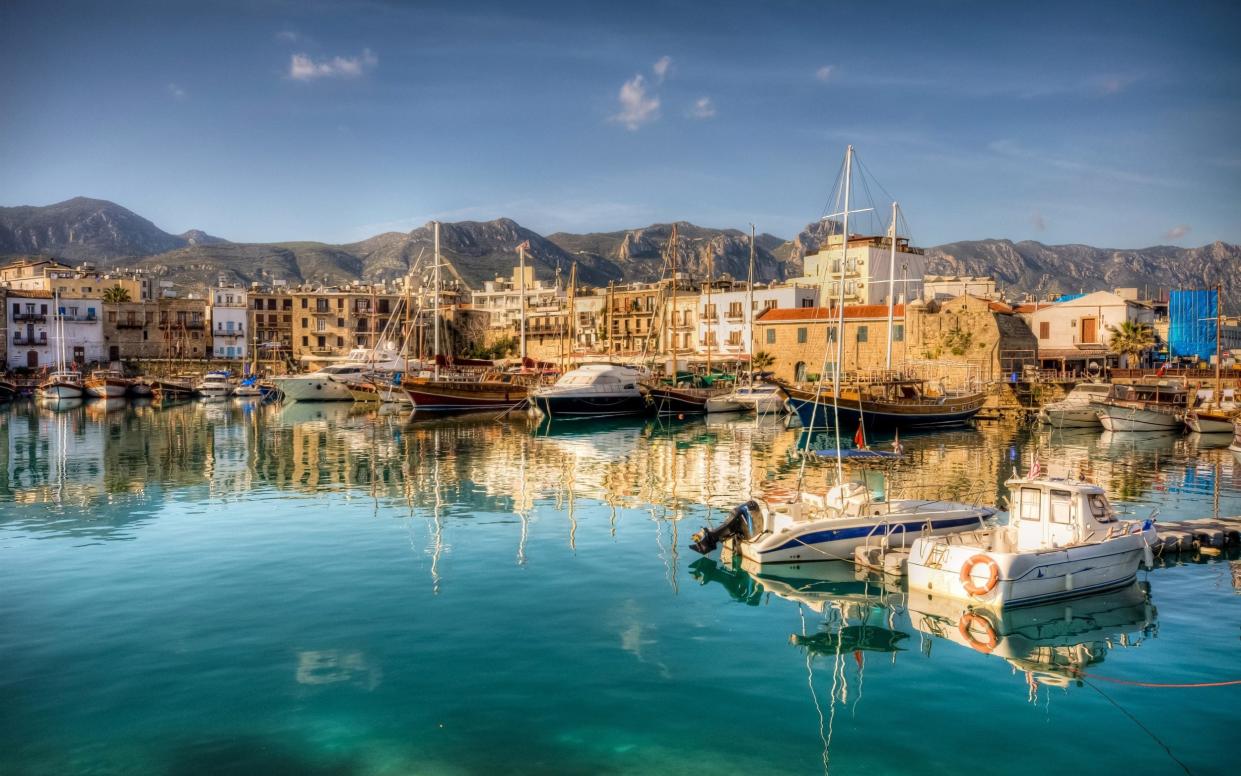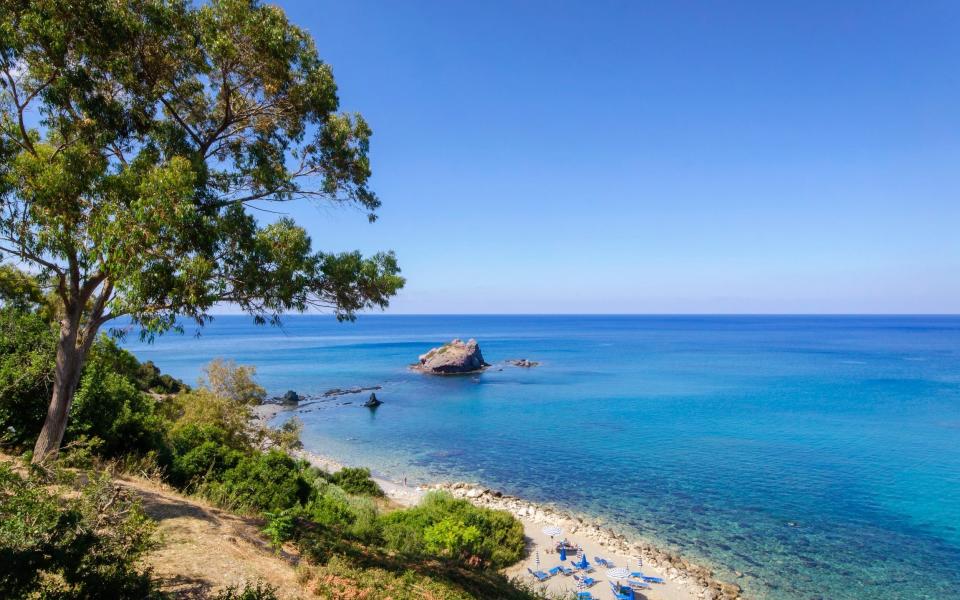Travel to Cyprus: latest Covid rules and practical guidance once you are there

Cyprus remains one of the Mediterranean’s most beautiful islands, but like so many has taken a firm stance when it comes to Covid-19 protocols.
It operates what has become known as a SafePass, which is a vaccination certificate showing you have had at least one dose of an EU-recognised vaccine at least three weeks prior to the date of presentation, or medical proof of recovery from Covid-19 in the last six months.
Alternatively, you may present a negative PCR test. The rule applies for anyone over 12 years of age. You may be asked to show a form of identify to proof the SafePass belongs to you.
Visitors to Cyprus are obliged to follow the same rules as locals. For Britons, and any other non-EU citizens, you must present your Cyprus Flight Card in an electronic or printed form. It is valid for seven days, after which you must test every 72 hours if you are not vaccinated. For EU citizens you should present your European Union Digital Certificate. Cruise ship visitors may also show a disembarkation card. Other visitors arriving by sea through a legal point of entry must show proof by the administrator of the marina.
Visitors will find that most bars and restaurants, and places of interest are open, albeit it with a quieter atmosphere than experienced prior to the pandemic, as a result of the recent introduction of the SafePass, and its equivalent.
Can I go to Cyprus?
Cyprus is on the UK's amber list. If double vaccinated, this means you don't need to quarantine on arrival back to the UK. If you have not been double vaccinated, you will need to enter a ten-day quarantine with the option to release after a test on day five.
The UK entered Cyprus’ red category on July 8. Double vaccinated Britons can enter without tests, but everyone else must take a test 72 hours before departure and provide proof on arrival. You must then undergo another PCR test upon arrival at Larnaca or Paphos airports, and remain in self-isolation until the result is issued. Test results should be available within three hours through the online platform. Passengers must pay for both tests.
Are flights operating?
Yes. British Airways, easyJet and Ryanair are among the airlines operating flights to Cyprus.
Will I be insured if I go?
The FCDO does not warn against non-essential travel to Cyprus, meaning your insurance is likely to be valid if you visit Cyprus, but do check your policy.
Do I need to take a test before travel to Cyprus?
If you have not been double vaccinated, you will need to take a PCR test 72 hours before departure. Children who arrive in the Republic of Cyprus before their 12th birthday, are exempted from the testing requirement.
Do I need to fill in any forms?
Yes. The FCDO advises: "All permitted travellers must complete a Cyprus Flight Pass before their journey, available on the Cyprus Flight Pass website. Where relevant, you will be responsible for ensuring your PCR test result is uploaded to Cyprus Flight Pass within 24 hours of your departure. If you need to provide your appointment letter you can upload both documents in a single photo. In addition to obtaining the Cyprus Flight Pass, passengers are required to carry with them, in hard copy or electronically, copies of these documents. You will be asked to present your flight pass prior to boarding and on arrival at immigration."
Do I need to self-isolate on arrival?
If you have not been double-jabbed, you must take a PCR on entry to Cyprus and enter a mandatory 72-hour quarantine on arrival until your test result is back. If negative, you can leave quarantine.
Essential tick-list: What do I need to travel to Italy?
Make sure you have the right paperwork and documents for your trip:
Before travelling, you will need:
Certification of your Covid vaccination – provided digitally (through the NHS app) or as a printout (this can be requested from the NHS by calling 119).
If you are not fully vaccinated you will need a certificate of a negative PCR test, taken 72 hours prior to departure.
All passengers need a Cyprus Flight Card, with pre-loaded test results if applicable, in an electronic or printed form.
Any additional non-Covid related visa/entry documents.
On arrival, you must:
If you are not fully vaccinated you must undergo another PCR test upon arrival at Larnaca or Paphos airports, and remain in self-isolation until the result is issued. Test results should be available within three hours through the online platform
To return to the UK, you will need:
Certificate of negative PCR or lateral flow test, taken in the 72 hours before travelling home.
A PCR test, taken within 48 hours of arriving back in the UK. You can find a full list of Government accredited companies here.
Exemptions may apply, and rules may vary for children. See the full FCDO travel requirements here.
Do I need to wear a mask?
It is compulsory for everyone over 12 years of age to wear a mask in all public inside and outside areas, including supermarkets, shopping malls, offices and banks, bars and other evening venues, and restaurants except when sitting at a table. Masks should be worn on all public transport. It is recommended for children to wear masks. This rule applies to visitors as well as residents and employees of, for example, shops. Most people respect the ruling.
What are the rules on beaches?
While a SafePass is mandatory for any place where 10 or more people might gather, one of the exceptions is beaches. Others are parks, linear parks, dams and nature paths. Social distancing is, nonetheless, in place on all public beaches and the use of masks is compulsory for everyone over the age of 12 years if moving around. If remaining sitting or sunbathing then masks may be removed. Social distancing and sanitization measures are in place.

What are the rules in bars?
It is compulsory to wear a face mask until seated when entering inside areas of bars, along with nightclubs and event venues. The serving of drinks at a bar is prohibited. You will need to show a SafePass, or its equivalent, and may be asked for ID, if the bar can cater for more than 10 people, including employees. This applies for outdoor and inside areas. You will be required to social distance (two metres).
What are the rules for restaurants?
As with bars, you will be required to show a SafePass, or its equivalent, when entering a restaurant that can cater for more than 10 people. The restaurant must deny entry for anyone without a SafePass, or inform the authorities of anyone who refuses to show a SafePass. The fine for non-compliance is hefty. Masks must be worn until seated. Only seated service is allowed with the maximum number of people per table set at eight.
What are the rules for shopping?
You must wear a face mask and social distance (two metres) in all shops. A SafePass must be shown when entering a shop that can accommodate more than 10 people, but not, for example, a bakery where a handful of people may be at any one time. A SafePass is necessary for larger supermarkets, department stores and shopping malls. Authorised officers have the right to ask for identification. Sanitizing gel is provided at the entrance to shops, which you are required to use.
What are the rules in hotels?
Hotels are obliged to follow similar protocols as businesses, such as in the retail and catering sectors, in so far as domestic guests must possess a SafePass and non-resident guests must show a Cyprus Flight Card or a European Union Digital Certificate in an electronic or printed form. Social distancing and mask-wearing is mandatory. Hotels must display their guidelines prominently. Hotels may choose to host only vaccinated guests, which they must make clear prior to accepting a booking.
What are the rules on public transport?
All passengers aged 12 years and over must present a SafePass or its equivalent when boarding a public bus, a private tour vehicle, using shuttle buses to and from airports or seaports, or using a taxi. All vehicle drivers and employees of such transport companies must be in possession of a SafePass. It is mandatory to wear a facemask. All such companies must show the current protocols prominently at their premises or inside their vehicles. Maximum capacity is 50%.
Shall I take cash, or pay for everything on card?
While making payments electronically is encouraged throughout Cyprus, and is available at shops, salons and catering establishments, cash is still widely accepted. A handful of businesses, such as transport and tour vehicles for example, are exempt from offering passengers the option to purchase a ticket by card onboard, but may at the companies’ premises. Small shops, such as bakeries or kiosks where a purchase is unlikely to amount to more than a few Euros, cash is welcomed.
Do I need to take a test before travelling back to England?
Yes. You must take a test 72 hours before departure. If you fail to do so, you will be denied boarding, or risk a fine of up to £500 on arrival back in the UK – this also applies to vaccinated travellers.
How is the case rate in Cyprus?
As of August 24, Cyprus has recorded 199 cases per 100,000 over the past seven days. This is a 14% week-on-week decrease.
How is Cyprus's vaccination drive going?
56% of the population has received a first jab; 50% have received a second jab.
Does Cyprus recognise the Indian AstraZeneca vaccine batch for entry?
Yes, Cyprus currently accepts travellers immunised with all the vaccines that have been approved by the European Medicines Agency (EMA) and several other doses, including Covishield, the Indian AstraZeneca batch.


